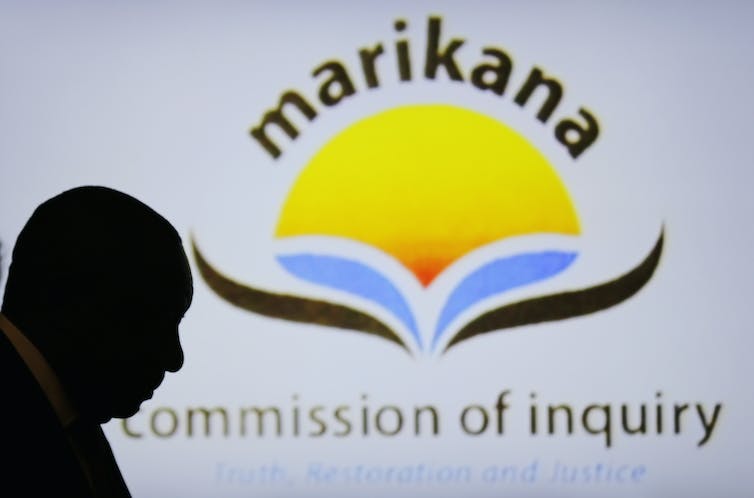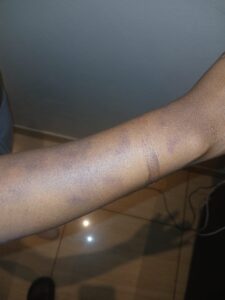By: Gillian Schutte
This women’s month marks a decade since the Marikana massacre. The widows of the 34 mineworkers slain by the South African Police Service during a strike in 2012 say they have since received their deceased husband’s provident fund dues as well as what they are calling an inadequate government payout. They are adamant that proper compensation has not been forthcoming so many years later.
In 2014 it was reported by the widows that the mining company Lonmin took on the responsibility of their children’s education and offered one male member of the family of the deceased a job in the mines to replace the breadwinners slain by the police. However, they said this is not enough and was poorly thought through.
When I interviewed some of the widows at the time, they expressed frustration and felt alienated from the so-called reparations process. Thabelo Mutzumi* spoke to me about the issues: “Yes it is true, these things have happened, but what is the use of sending our kids to nice schools if they come home to no food, a tin shanty and so many problems that have not been dealt with? A breadwinner in the (extended family) does not mean that our needs are met. He has his own wife and kids to think of. It causes infighting in the families too. They did not even consult us properly to find out what we need. Maybe we could have been given the jobs,” she said.
“We don’t know what we did to Lonmin and the government to make them hate us this way and treat us with no respect. Our houses are falling down and they have never delivered on the stuff they promised us. I pray a lot to ask God to help us, but sometimes I even doubt God’s existence because of our suffering,” said Mutzumi.
On 10 August 2022 EWN reported that according to Solicitor-General Fhedzisani Pandelani, R74 million has been distributed to 36 families of the slain mineworkers. This amounts to approximately R500 000 per family. However, the Socio-Economic Rights Institute (Seri) stated this year that: victims were yet to be compensated for psychological trauma caused by the massacre. They further stated that so far they have only been compensated for the loss of income support and the 36 families it represents say this is not enough. The families argue that this is money the miners would have been earning were they not killed so mercilessly in August 2012 and does not count as reparations. Asenati Tukela of Seri agrees saying that: “Compensation hasn’t really happened; on all of the other four demands, nothing has happened despite the commitments that they want to fix this issue.”
In addition, not all the widows have received the houses promised to them in the aftermath. They say that the pay-out has not alleviated the burden on them as women and that life for them remains hard as they face a multitude of socioeconomic and environmental difficulties in their day-to-day existence in untenable conditions.
In 2019 Lonmin was bought by Sibanye-Stillwater, a company that, like Lonmin,
has continued to fall under the radar when it comes to accountability for these substandard conditions of the settlements around their operations, where taps are few and sanitation non-existent. This places the added burden on women who spend much of their day collecting water at late hours from taps that are a distance from home, in addition to collecting firewood for cooking, as there is no electricity in the informal settlements.
Daily life in Wonderkop and eNkaneni for women is hard, much harder than anyone who has not experienced poverty can imagine. The area looks like a surreal medieval landscape dotted with signs of the age of technology in hand-painted cell phone signs that hang lopsidedly off the walls of tacked-together corrugated tin shops.
What we find in these areas are desperate workers struggling to eke out a living. We find tin shanties surrounded by muddy walkways that are hard to navigate by foot or cars. We find little children playing in this mud and on mounds of waste and litter because services are few and far between. Neither government nor the corporates have even considered building these children a playground or crèche.
Here there are no toilets and women are at the end of their tether in trying to manage their families’ sanitation needs as well as feed families of children whilst unemployed. HIV levels are high, though the corporate reports will say that few people suffer from this virus under their watch. There are also high levels of respiratory diseases and cancers due to environmental toxins in the air, water, and the land that the communities are built upon.
Benchmarks Foundation research indicates that the mines in the Rustenburg mining belt are poisoning the land and the water through unchecked pollution. Toxic sulphur dioxide leaks spill into the water sources that supply the communities who then have no choice but to drink from and wash in it.
In these conditions people cough and wheeze and babies are sometimes born with deformities caused by environmental poisoning.
On top of the PTSD and other mental health issues that have manifested in children and adults in the aftermath of the massacre, the financial pressure that dealing with ill-health puts on these already impoverished communities pushes them to borrow money from loan sharks at exorbitant interest rates and keeps them in a cycle of debt, poverty, and subjugation.
This harsh reality completely contradicts what the mining companies are telling the global public. They claim, in sustainability reports that go out to the world that they invest amply into these communities. They also claim that they work hard to improve upon their poor environmental track record as they aim to reach a state of zero environmental harm to surrounding settlements.
John Capel of the Benchmarks Foundation sheds light on this in a May 2013 interview, in which he said that these promises often play out as confessions around pollution spills and other environmental transgressions, always with the disclaimer that they plan to fix it all. It is a never-ending confessional as nothing ever seems to improve and not enough pressure from the government is ever exerted onto these companies to clean up their act. The reality, according to Capel, is that these corporates are putting little more than 1% of their profits back into developing these communities or cleaning up their operations, despite their claims on paper.
Meanwhile, the untenable multi-systemic violations perpetrated on communities living close to these wealthy mining operations, coupled with exploitative wages, continue to push people to breaking point.
Though it is clear that these dire socioeconomic factors are the root cause of strike action and unrest, they are often the most overlooked in the analysis offered on media platforms for why strikes and civil unrest occur.
The Farlam Commission’s focus was largely dominated by Phase One of their inquiry, the issue of police brutality against the miners. When this was concluded some two years later the inquiry went on to focus on Phase Two – the systemic socio-economic factors that contributed to the strike action in the first place. Despite this phase though, no real interventions were, or have been, made to improve the living conditions around this mine. People continue to live in sub-human conditions. This is a human rights concern and ought to be tackled as one.
While people are being exploited, enslaved, and violated with impunity by multinationals and local mining companies, and while this is well hidden behind expedient social investment advertorials and greenwashing campaigns, human lives will continue to be expendable and worthless to corporations that put profits before people.
This is ultimately the premise for the strike actions that arose in 2012, which ended in the massacre that left so many women carrying the burden.
It seems President Ramaphosa has no interest in taking responsibility for his role in the massacre when, as a non-executive director of Lonmin at the time, he influenced the outcome when in a fateful email, he all but called for concomitant action to be taken against the striking mineworkers. Instead, he has chosen to challenge the civil case brought against him by 328 Marikana mineworkers who are demanding a full apology and compensation of R1 billion from him.
As a *widow once asked – “How does President Ramaphosa sleep at night when we, the widows, watched in horror our husbands being gunned down, and have continued to struggle for justice for ten years.”
It is outrageous that Lonmin, the state, and Ramaphosa have still not been held responsible for their failure to fully account for their role in the massacre and neglecting to adequately compensate the victims of the shooting and the widows of the mine workers slain for striking for a better life – a life of dignity for themselves and their families – the same dignity that the constitution promises all in South Africa.
*Name changed to protect identity.
*Name withheld to protect identity.
Gillian Schutte is an award-winning independent filmmaker, writer, and social justice activist. She is a founding member of Media for Justice.







